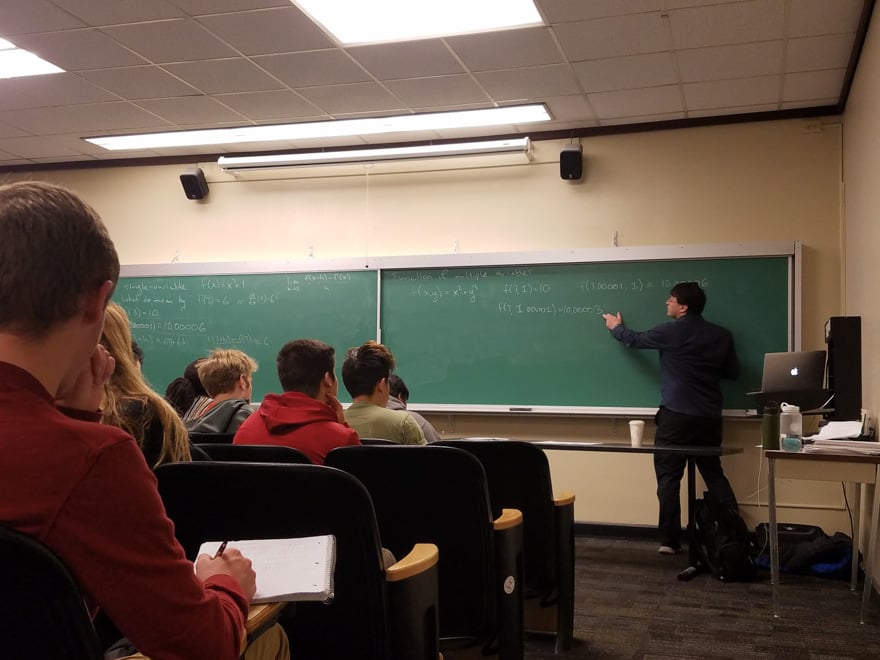Amid continued debate on California high school math education, an opposing complaint was filed with the University, in response to concerns raised about Jo Boaler’s contributions to a new math framework.
Duane Habecker, California Mathematics Council central section president, filed a complaint with the Office of the Provost against Stanford math professor Brian Conrad. The complaint, which was filed in late April, criticizes Conrad’s “reckless disregard for academic integrity and the safety of fellow Stanford professor, Dr. Jo Boaler,” according to documents obtained by The Daily.
Conrad is one of a number of public critics of the recently revised California Math Framework (CMF), the document that advises K-12 educators in California, which math education professor Jo Boaler helped to write. Especially drawing controversy, Boaler advocates for offering data science as an alternative Algebra II in high school math requirements — an effort she argues would make high school math more equitable.
Critics like Conrad say that this switch would leave high school students unprepared for college-level math.
In 2022, when the CMF was in the editing process, Conrad created a website to publish comments and concerns with the CMF. The recent complaint delves into some concerns raised by critics on Boaler’s research.
Conrad wrote in an email to The Daily that he was not aware about the complaint lodged against him nor the University’s response. In response to the complaint, he wrote, “Anyone who looks at what I have written or said on these matters can see that I never singled out any specific CMF author, contrary to what is claimed.”
The complaint follows an anonymous complaint filed in March against Boaler, accusing her of citation misrepresentation in both her individual work and her work in helping revise the CMF. According to Habecker, it stems from criticism that moves beyond the research to personal attacks.
The complaint raises twelve examples of Conrad’s critiques paired with Habecker’s response countering these critiques. Habecker wrote that Conrad “has gone beyond critiquing the research and ventured into stochastic terrorism through indirect and vague attacks on Professor Jo Boaler’s work, which has led the public to myopically targeting Dr. Boaler rather than the entire CMF writing team.”
Boaler has received threats to herself and her family due to her involvement in the CMF, she wrote on her Stanford profile.
Neither complaint will receive a formal University investigation.
“We received this information and believe this matter is one properly resolved through scholarly debate rather than through a formal university process,” wrote University spokesperson Dee Mostofi. “The university does not take a position in these matters.”
The first anonymous complaint against Boaler inspired Habecker to file his own complaint, Habecker said, helping him realize that it was a tool he could use to voice his concerns about the lack of scholarly debate he saw in both the anonymous complaint and Conrad’s public criticisms with the CMF.
The fact that the original complaint was anonymous “runs against the whole point of conversation and discourse and disagreeing,” Habecker said. “Math is a wonderful topic to disagree about and have real, authentic, meaningful conversations.”
He said that he thinks the CMF is one of the best resources for high school math teachers, and Conrad is “undermining people’s faith in the CMF.”
Habecker’s complaint takes issue not only with Conrad’s website, but also with Conrad’s recent testimony at a California senate hearing about a “math excellence package” that would add six members to the California State Board of Education’s Instructional Quality Commission.
Disagreeing with Habecker’s characterization, Conrad countered that his testimony was not an effort to discredit the math framework. This claim “is contradicted by the fact that I never mentioned the CMF,” Conrad wrote.
Conrad posted an update to his website on May 5 in response to Habecker’s complaint, claiming that, “The submitted complaint is everywhere dense with factual inaccuracies.”
Boaler has continued her support for the CMF, despite its critics.
“It is my understanding that [Habecker’s] complaint has been filed in defense of everyone who worked on all stages of the CMF, the statutory process and the K-12 educators and students who will be impacted,” she wrote in an email to The Daily. “Insofar as [Habecker’s] submission might apply to my situation, I will be grateful if his viewpoint is considered.”
A previous version of this article misrepresented the year Conrad created his CMF website — the website was created in 2022, not in 2023. The Daily regrets this error.
